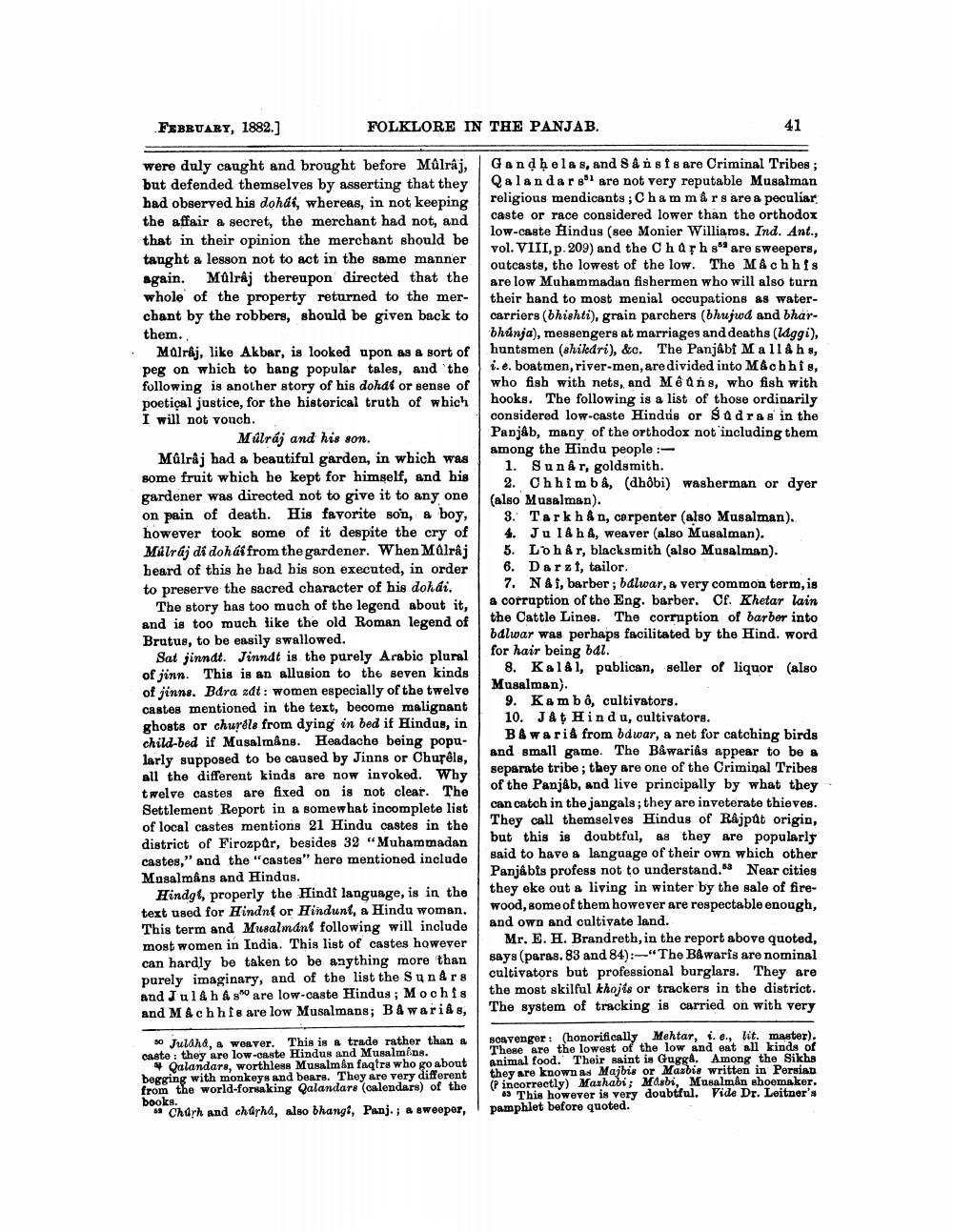________________
FEBRUARY, 1882.)
FOLKLORE IN THE PANJAB.
41
were duly caught and brought before Malraj, Gandhelas, and Så nsis are Criminal Tribes; but defended themselves by asserting that they Qalandar go are not very reputable Musalman had observed his dohai, whereas, in not keeping
religious mendicants ; Chammars are a peculiar the affair a secret, the merchant had not, and
caste or race considered lower than the orthodox that in their opinion the merchant should be
low-caste Hindus (see Monier Williams. Ind. Ant.,
vol. VIII, p. 209) and the Charh g" are sweepers, tanght a lesson not to act in the same manner
outcasts, the lowest of the low. The Machhis again. Malraj thereupon directed that the
are low Muhammadan fishermen who will also turn whole of the property returned to the mer- their hand to most menial occupations as watercbant by the robbers, should be given back to carriors (bhishti), grain parchers (bhujud and bhar. them.
bhinja), messengers at marriages and deaths (Idggi), Malraj, like Akbar, is looked upon as a sort of huntsmen (shikdri), &c. The Panjabt Mallahs, peg on which to bang popular tales, and the i.e. boatmen, river-men, are divided into M&cbhis, following is another story of his dohat or sense of who fish with nets, and M& ans, who fish with poetical justice, for the historical truth of which
hooks. The following is a list of those ordinarily I will not vonch.
considered low-caste Hindus or sadras in the Målráj and his son.
Panjab, many of the orthodox not including them Malraj had a beautiful garden, in which was
among the Hindu people :
1. Sunar, goldsmith. some fruit which he kept for himself, and his
2. Chhimba, (dhồbi) washerman or dyer gardener was directed not to give it to any one
(also Musalman). on pain of death. His favorite son, a boy, 3. Tarkhân, carpenter (also Musalman). however took some of it despite the cry of 4. Ju 18 h A, weaver (also Musalman). Mulraj di doháf from the gardener. When Malraj 5. Lo har, blacksmith (also Musalman). heard of this he had bis son executed, in order 6. Darzt, tailor. to preserve the sacred character of his dokdi.
7. N&i, barber; bdlwar, a very common term, is The story has too much of the legend about it,
a corruption of the Eng. barber. Of. Khetar lain and is too much like the old Roman legend of
the Cattle Lines. The corruption of barbor into Brutus, to be easily swallowed.
balwar was perhaps facilitated by the Hind, word Sat jinndt. Jinndt is the purely Arabic plural
for hair being bal. of jinn. This is an allusion to the seven kinds
8. Kalli, publican, seller of liquor (also
Musalman). of jinns. Bdra adt: women especially of the twelve castes mentioned in the text, become malignant
9. Ka m bô, cultivators. ghosts or churéls from dying in bed if Hindas, in
10. JAt Hindu, cultivators. child-bed if Musalmâns. Headache being popu
BAwaria from bdwar, a net for catching birds larly supposed to be caused by Jinns or Churéls,
and small game. The Bawariâs appear to be a all the different kinds are now invoked. Why
separate tribe; they are one of the Criminal Tribes twelve castes are fixed on is not clear. The
of the Panjáb, and live principally by what they Settlement Report in a somewhat incomplete list
can catch in the jangals; they are inveterate thieves. of local castes mentions 21 Hindu castes in the
They call themselves Hindus of Rajpat origin, district of Firozpur, besides 32 "Muhammadan
but this is doubtful, as they are popularly castes," and the "castes" here mentioned include
said to have a language of their own which other Masalmâns and Hindus.
Panjabts profess not to understand. Near cities Hindgt, properly the Hindi language, is in the
they oke out a living in winter by the sale of firetext used for Hindnf or Hindunt, a Hindu woman. wood, some of them however are respectable enough, This term and Musalmant following will include and own and cultivate land. most women in India. This list of castes however
Mr. E. H. Brandreth, in the report above quoted, can hardly be taken to be anything more than says (paras. 83 and 84):-"The BAwaris are nominal purely imaginary, and of the list the Sun & rs cultivators but professional burglars. They are and Jul 4 h & sho are low-caste Hindus; Mochis the most skilful khojís or trackers in the district. and M&chhfs are low Musalmans; BA warias, The system of tracking is carried on with very
10 Juláha, a weaver. This is a trade rather than Bonvenger: (honorifically Mehtar, .., lit. master), caste: they are low-caste Hindus and Musalmi.ns.
These are the lowest of the low and eat all kinds of Qalandare, worthless Musalman faqira who go about animal food. Their saint is Gugga. Among the Sikha begging with monkeys and bears. They are very different they are known as Majbis or Maxbis written in Persian from the world-forsaking Qalandare (calendars) of the (P incorrectly) Mashabi; Masbi, Musalman shoemaker. books.
43 This however is very doubtful. Vide Dr. Leitner's Charh and charha, also bhangi, Panj. ; & sweeper, pamphlet before quoted.




